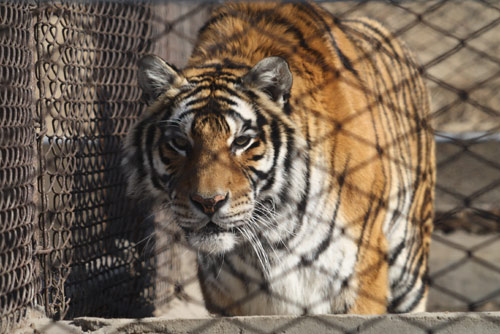|
 A?siberian tiger is seen at Shenyang Guaipo zoo, another private one raising tigers in the city. by Wu Yong A?siberian tiger is seen at Shenyang Guaipo zoo, another private one raising tigers in the city. by Wu Yong |
Experts worried about fate of remaining animals at zoo in Shenyang; investigation launched
SHENYANG: An investigation has been launched into the deaths of 13 Siberian tigers in the past three months at a zoo in Shenyang, capital of Northeast China's Liaoning province.
Now experts are worried about the fate of the remaining animals.
"I'm afraid that the tigers will die one after another because of malnutrition and cold weather. If we don't help these poor animals as soon as possible, we will lose the best time to save them," said Hua Ning, project director of the International Fund for Animal Welfare China.
The Shenyang city government has allocated 5 million yuan ($732,000) for rescuing the remaining animals and another 2 million yuan for resuming the Shenyang Forest Wildlife Zoo's normal operation, Zhang Jinghui, spokesman of the city government, said at a press conference on Sunday.
The situation at the zoo was exacerbated on March 9 when workers went on strike over back pay.
"We haven't been paid for 18 months. We love animals, but we can't make a living," a breeder named Zhao told China Daily.
The zoo has had to use office workers to feed the animals.
"Even if some amateurs do it, I don't think they will do it well due to a lack of professional skills and knowledge," said Zhao.
After checking the condition of the remaining tigers, Zhang Xiwu, a director-general with the State Forestry Administration, said the tigers are doing well. They will invite experts to create a proper diet for the tigers to ensure their health.
Eleven tigers died at the zoo between Nov 11 last year and Feb 27.
"No matter who deals with the issue, we hope they give priority to solving real problems. Give workers their pay, then the tigers will be fed and their environment will improve. Otherwise, there is not even anybody to clean the crates," said Zhao.
According to Wu Xi, a deputy head of the zoo, the 11 tigers died of diseases like renal failure and heart failure in the past three months and two others were shot dead in November 2009 when they attacked a zookeeper.
"I believe four reasons are being blamed for the death of these tigers. The first is that the tigers were kept behind iron bars indoors instead of being allowed outdoors, which prevented them from exercising and keeping warm. The second is food shortage. This long and chilly winter also worsened the situation. Lastly, I have to say, our zoo is poorly operated," Wu said.